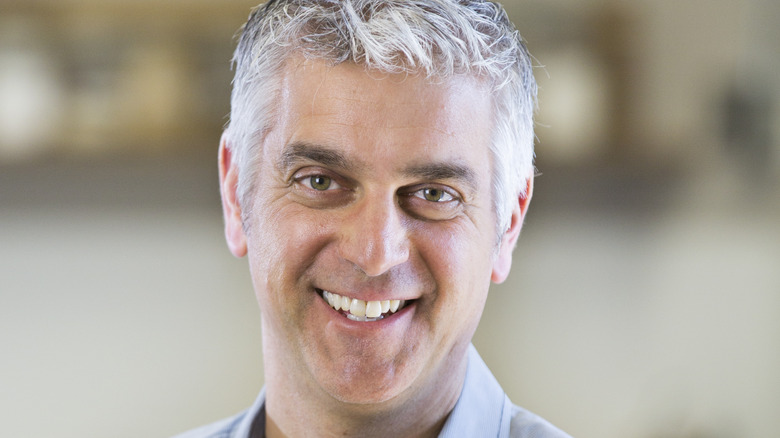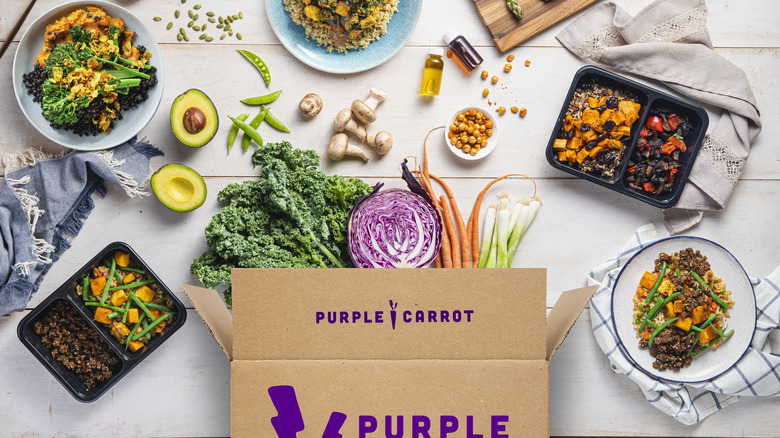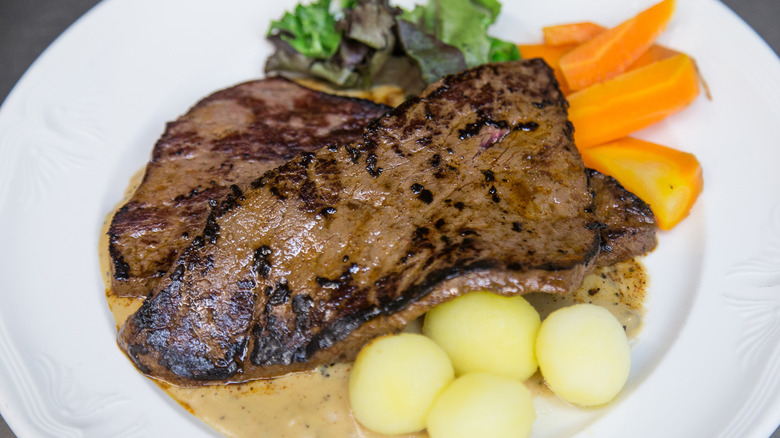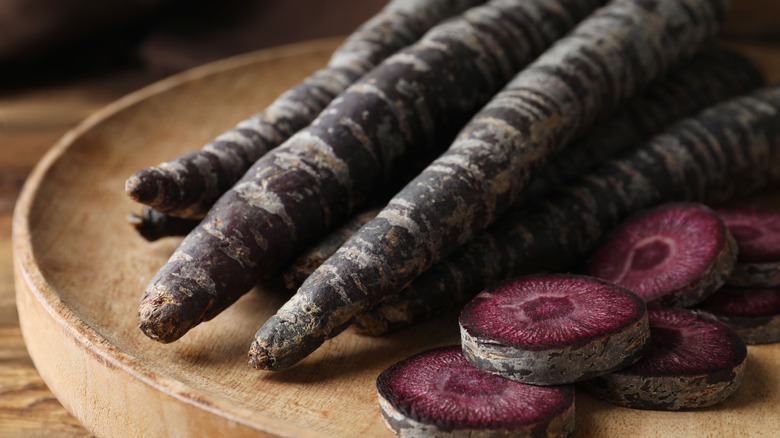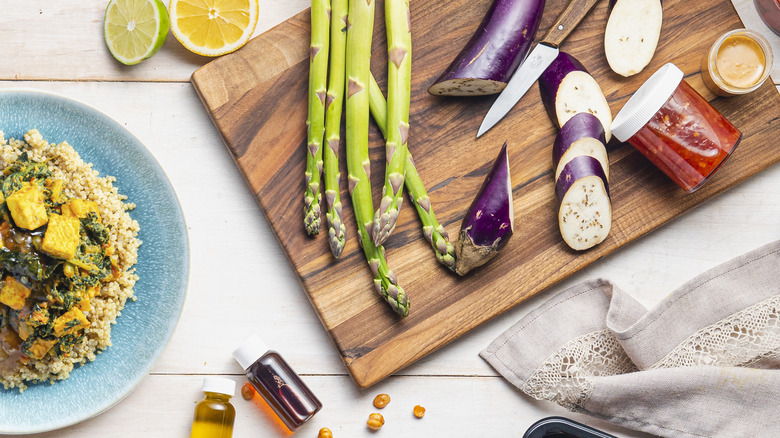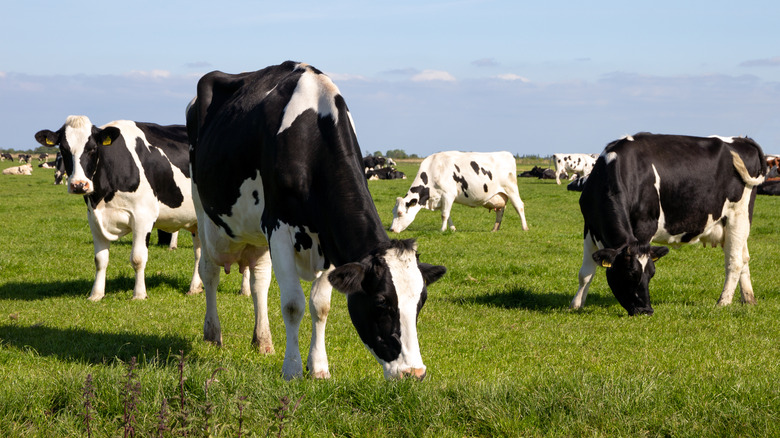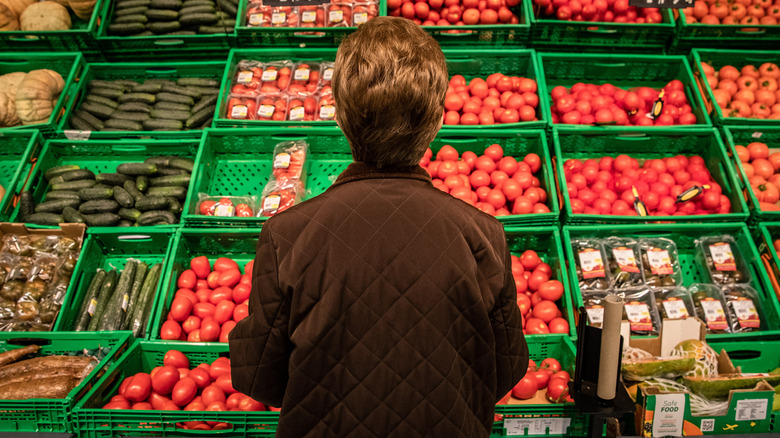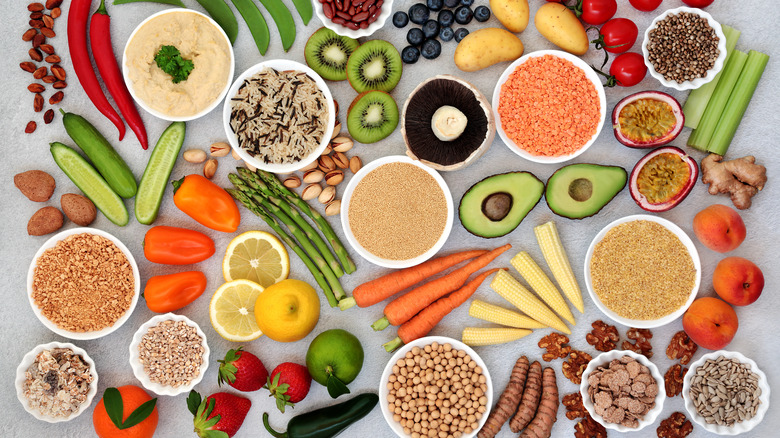Purple Carrot CEO Andy Levitt Talks Plant-Based Cooking And Mostly Vegan Eating – Exclusive Interview
Andy Levitt, the founder and CEO of plant-based meal kit and pre-prepped meal delivery company Purple Carrot, didn't grow up dreaming of working in the food industry. In fact, he didn't even come to the culinary world until he was already a solid two decades into his professional life. And while, as an adult, he was always a conscientious eater, what Levitt ate didn't play a central role in his life.
So why did Levitt start Purple Carrot, and why has he devoted years of his life to plant-based foods? Because he saw both a need and an opportunity. And because he saw a documentary that opened his eyes to the fact that Americans really need to change the way we eat, and that's for the sake of our own health and wellness, for the welfare of the animals raised for slaughter — many of whom are abjectly mistreated — and for the good of our planet as a whole.
That's a lot to think about, right? This is why Levitt and his team at Purple Carrot spend many of the waking hours of their lives thinking about how they can get healthy, tasty, sustainably produced, and 100% vegan foods delivered to the doors of people who often have the same kinds of thoughts about the foods they eat and the implications, great and small, thereby created. Levitt dished on all of this during a recent Health Digest interview.
Why Andy Levitt started Purple Carrot in the first place
What inspired the creation of Purple Carrot, according to Andy Levitt:
Purple Carrot is a 100% plant-based meal kit company I started back in the fall of 2014. I'd spent about 20 years or so in the pharmaceutical sector — in sales, marketing, management strategy — and I was really passionate about the way Western medicine helped address all the problems that people have with their health. And then I watched this documentary called "Forks Over Knives" back in January of 2014. It opened my eyes up to this whole idea of plant-based eating and the way that food is medicine.
I started understanding the real incredible power of a plant-based diet as the antidote to the standard American diet, which is highly characterized by meat and dairy consumption, as you may know. To think about a plant-based diet being able to be so effective at giving people a chance to eat well and feel a lot better without relying on Western medication was really compelling. And I turned to my wife and I said: "That's what I'm going to do."
She said, "What are you talking about?" I said, "I'm going to start a plant-based meal kit company."
And knowing way too little about the space or how complicated it was going to be, I set out as an entrepreneur with the idea that more people need to know about the value of a plant-based diet. Meal kits were really pretty new on the scene at that point, maybe a year in or so with folks like Blue Apron and HelloFresh that were these very well-funded venture-backed organizations that were going after a land grab. And my approach was to really go to the edge to differentiate on the fact that we were plant-based. Everybody else was not at that point. And we could differentiate by creating something that was delivering incredibly flavorful meals that was targeted for the non-vegan.
I always said it was going to be vegan food for non-vegans. That's where the market was and I think that's where the market still is. It's been a heck of a ride, it really has been. It's been so fun to put this out into the universe and focus on helping people's health and the health of our environment. We've just enjoyed tremendous growth over the last seven-plus years since I started it out of my garage. And I'm incredibly proud of what we've done.
How Levitt's eating habits changed over the years
Did food play a notable role in your younger years? Or did you come to the culinary realm farther into your adulthood with Purple Carrot?
I have fond memories — my mom, she always cooked, and I had meals pretty much seven nights a week in my house growing up. [It was] a very traditional upbringing of meat, starch, protein type of idea. A protein, starch, vegetable setup.
We ate pretty healthfully, but there was no diet that we were following per se. I'm a real picky SOB when it comes to food. I'm particular about what I cook and as I've grown up, I've always enjoyed cooking. I find it to be very therapeutic when I've got other stuff on my mind. If I can just go and prepare a meal for my wife, my kids, and myself, I let go of some of the many other things in my mind to focus on putting together something that's going to be really tasty.
I've had ideas of opening up my own restaurant years ago, and it's a very difficult industry and category. And my heart goes out to all of the restaurateurs who've taken on the chin over COVID over the last couple of years by no fault of their own. But this was really just a different [approach]. I focused it less on the culinary experience and more on the entrepreneurial spirit part of it that I felt like this is an opportunity to go pursue and there was something good in it. I felt like the mission of the company was the right North Star direction to pursue and go after. Obviously, I was trying to be profitable and make money as an entrepreneur and a capitalist, but it was really about making a difference and doing something meaningful that I could put my heart and soul into. And if we did it right, we might be able to succeed.
Putting health and wellness on the menu
Was a focus on health and wellness something that's always informed your life? Or was it more that you saw the opportunity there as an entrepreneur and thought, 'I can do well while doing good'?
Probably a little bit of both. I spent a majority part of my adult life working in the health and wellness space within pharmaceuticals and I worked on a range of different conditions. I think I developed a good level of empathy for patients who suffer largely from chronic conditions.
I was undiagnosed with Crohn's disease until about nine or 10 years ago, and that wasn't fun. I think diet plays a key role in managing a condition like that. A plant-based diet has shown to be the antidote and the only real diet that has [been] shown to reduce or reverse the effects of a lot of these chronic conditions like diabetes or hypertension or high cholesterol and obesity.
There's a lot there that brought value in terms of doing the right thing by doing good. But it was also like, hey, there's a huge growing market of meal kits. Look at what Blue Apron's doing. Why isn't anyone doing this in the plant-based space? I felt like that was the opportunity to pursue, to wedge into a category that I believed was going to be really large, that there wasn't going to be a winner-take-all spot. And that if I could differentiate on the plant-based angle and build the brand in the right way, that would resonate with people, especially those who were not vegan and there'd be something there to pursue.
Purple Carrot: The reason behind the name
What was the inspiration for the name Purple Carrot?
I'm a humongous fan of a guy named Seth Godin. Seth is an incredible person — he's a great writer. He's a great entrepreneur, brilliant marketer, and I've studied him for 20-plus years. I've developed a nice friendship with him and he's been one of the most significant influences in my life. As I considered starting the brand Purple Carrot, I was walking down Park Avenue South in New York City one night and thinking, what would I call this vegan meal-kit business that I wanted to start?
I thought about Seth and I thought about his books. One of the books that he wrote was called "Purple Cow." That was all about transforming your business by being remarkable. I thought, Purple Cow ... Purple Cow ... Purple Carrot. How about that?
Lo and behold, I learned that all carrots used to be purple and they were re-engineered to be orange by the Duke of Orange. The URL purplecarrot.com was available for like 1,900 bucks on GoDaddy. There was a Purple Carrot food truck in Minnesota, but there was no brand of relevance that seemed to be standing out. I went with it.
Andy Levitt sets the record straight on plant-based eating
What are common misconceptions people have about plant-based eating?
A common misconception is that it has to be healthy or that it's organic. I think people create these storylines in their mind because you could eat Oreos and drink Diet Coke all day and say you're vegan and that doesn't necessarily provide any helpful benefits. I think there's a misconception that plant-based means it's just a bunch of tofu. It's eaten by people wearing Birkenstocks in Vermont covered in tattoos and that it's fringy. I feel like there's been such an evolution of the plant-based nomenclature, if you will, that there's so many amazing brands that have come out over the last five years or so that have transformed the way people think. And solving a lot of those myths — they are easily debunked at this point — and people realize, okay, there's more to it than just tofu.
There are ways to make really great meals focusing on just plant-based ingredients and whole-food ingredients. I think some of the newer products that are out there are not always healthy. A lot of them are highly processed. I look at brands like Beyond Impossible, which have done great things for their category as baby steps people can take to migrate into a plant-based diet since they too appeal to the non-vegan. An Impossible Burger, I think, tastes delicious. It tastes a lot like meat. It's a good way for someone to do that, especially as more and more people become mindful of their own health. There's plenty of data out there now that speaks to the value of a plant-based diet as a very helpful approach.
The global benefits of plant-based eating
Plant-based diet benefits beyond the individual, according to Andy Levitt:
There are more and more data that speaks to the challenges in our environment and animal agriculture is a huge catalyst of global warming. ... And I think that COVID shined a bright light on some of the inhumane treatment of animals. We don't really focus on that at all, it's a distant third for reasons why people choose Purple Carrot after their health and the health of our environment, to think about the humane treatment of animals. There was a handful of examples early on in COVID that I think made people really react and say, "Is this a bit barbaric that we're eating animals?" Which I think it is, and I'm not vegan — I say that with full awareness. I'm largely a plant-based eater, but at times I will enjoy some animal protein.
I think there's also been a really nice improvement there. I think it used to be, back maybe in the early 2010s, if you weren't vegan it was very black and white, there was no gray. I think there's become a much greater acceptance of someone being plant-forward or plant-curious or plant-based. That doesn't mean you can't ever have a burger or a piece of chicken or something [like] that.
I think that level of acceptance and balance is helpful and healthy, just knowing how difficult it is to be vegan. I think those who are vegan do so because of ethical beliefs, that they really understand the pain and suffering from animals who are killed for our own consumption. I admire their commitment to that. For the rest of us who don't have the discipline then I think at least keeping your diet 80 to 90% plant-based is a more sustainable way to go about eating.
Mistakes people make when going plant-based
What are some common mistakes people make when they start to cook plant-based foods and change their diets?
Well, I'll say that Purple Carrot tries to help people avoid [mistakes] because we teach them how to make plant-based foods taste delicious. When I first started, I had no idea how to make plant-based foods taste good, and I thought it wasn't terribly flavorful or tasty. Like last night I had a crumbled tempeh with buffalo sauce over quinoa with some cashew cheese — I would never have known to make that years ago. I think meal kits provide a great level of guidance and elevated sophistication for the home chef. I think most people know how to make basic meals. They know how to make meatballs and spaghetti or panko-crusted salmon or steak tips on the grill or something that's relatively mainstream. I think most people don't know how to make a tofu banh mi sandwich or a jackfruit torta.
There are these dishes that our culinary team has developed that I think just blow your mind of how flavorful they are and how they just don't need to use any animal protein, any dairy, and are almost exclusively whole food. Very few processed items ever make it into our meal kits.
I think the mistake people might make is trying to do it on their own without guidance, just without anything. Where I think Purple Carrot has really stood out is to help people do something they just don't really know how to do or wouldn't know how to do without our guidance. And it's addressing that need, which is why we've been so successful.
The changing ways of American eating
How have you seen American eating habits change in recent years? And what trends do you foresee in the near future?
Our business has grown dramatically in the last two years, largely influenced by the effects of COVID. As I said, by no fault of their own restaurants have had a very tough time. As people have been nervous to go out — and early on in those days people were nervous and didn't go to the grocery store — meal kits like Purple Carrot did very well. I think that we provided a level of comfort and certainty for people in a very uncertain world and it was like, "Okay, at least I've got my meals and I can control how I'm cooking this, because my god, I can't control much else going on in the world right now!" I think there's a strong feeling about that. I think there's been a big movement back in towards home cooking. But it wouldn't surprise me if that snaps back the other direction in six or 12 months from now.
Hopefully, COVID — Delta, Omicron — is all largely in our rearview mirror soon, I do hope for the restaurants out there that people will go back in droves and really support those restaurateurs who struggled, and the wait staff and the servers and bartenders, and all those people who rely on people. I think that meal kits have found their place in the world. I think that people will continue to find joy in cooking at home and maybe there's going to be [a change]. Maybe the pendulum has swung too far one way now, and it's going to swing back a little bit towards the center where meal kits will have their place in people's lives. Restaurants will still have a place in people's lives to socialize and just have a night out.
I do think there's definitely a movement towards healthier eating. I think that's a very certain mind shift as COVID has shown us all the fragile nature of our health and how precious it is when we are healthy and how devastating it can be when you're not. I think people want to be a bit more active in eating a healthier menu every week, even every night, than they may have been before.
Andy Levitt wants people to eat plant-based whether they're customers or not
Are you ever concerned that as people get comfortable with home cooking and come to really enjoy it, they'll simply start buying their ingredients directly and cooking more plant-based on their own? Or do you see that as a win?
Our mission is to help people eat more plants. As we see from people when they do cancel their subscriptions, that one of the top reasons they cancel is: "I'm now cooking on my own." If we can do our job of giving people an experience for three weeks, three months, or three years, or longer with some people, we've done our job I think, and hopefully the recipes we share and we post online and in the recipe booklets we ship every week provide inspiration for people to embrace plant-based eating for their health and the health of our environment. Hopefully they've had such a good experience with us they're going to tell their friends who also might want to learn how to eat plant-based that they should try Purple Carrot too.
What is your personal favorite Purple Carrot meal kit and your personal favorite prepared meal? Unless that's like asking you to pick a favorite child...
It sort of is. What I find myself doing is being continually surprised and delighted with the flavors and the ingenuity and creativity that comes out of our kitchens. I'm distant from the recipe creation — that's handled by a woman named Andrea Nordby and our team of culinary folks who work for Andrea.
As someone who is a plant-forward eater, it's just a delight to sit down every week and enjoy three different meals that range in style, range in ethnicity, range in culinary complexity, but they're all plant-based. I know that I'm going to eat well every week when I've got Purple Carrot showing up at my door.
You are what you eat
What role does food play in a person's overall health? And what are some of the easiest changes people can make in the way they eat to improve their overall health?
There's that expression that your body is a temple and what you put in is how you're going to feel and what you'll get out of it. People should be eating well. So hopefully you're eating three meals a day, maybe a few snacks along the way. I think someone's failure to be selective about what foods they are putting in their mouth everyday — it's a huge obligation and responsibility that you have to yourself, to people in your family and people close to you. Unfortunately, there's this large segment of our population who does not have the means to eat well, and they eat bad food that's cheap and not healthy at all. Separate those people out of the people who are going to have the choice.
A meal kit like Purple Carrot is a premium product, and we can acknowledge that. But I think it's so incredibly important to make smart choices about what you're eating and having a balanced diet and being mindful of an amount of protein, carbs, fats, fruits, and vegetables that you're putting into your mouth and getting into your diet in a given day. I think that people think like, "I'll never lose that weight" or "I'll never be able to be healthy" and they just rely on [easier choices].
Big Food doesn't make it any easier because they are so good at adding so much salt and flavor into certain highly processed products that create this addiction that's hard to fight off. But making a disciplined approach, making small steps and incremental changes improve your diet in a very short amount of time, we're talking two, three weeks.
Your taste buds change, you can start to develop new habits no matter what your age is, and begin to see the positive effects that smart eating and healthful eating can have on your health and well-being. And you are going to think more clearly and have more energy. And I think hopefully [you'll] be a happier person and be ahead of a lot of the diseases that I think come from [unhealthy] food. So if you're not careful about what choices you're going to make, you're going to find a rapid decline and a shortening of your lifespan and the quality of your life.
Check out Purple Carrot for all sorts of plant-based eating options.

